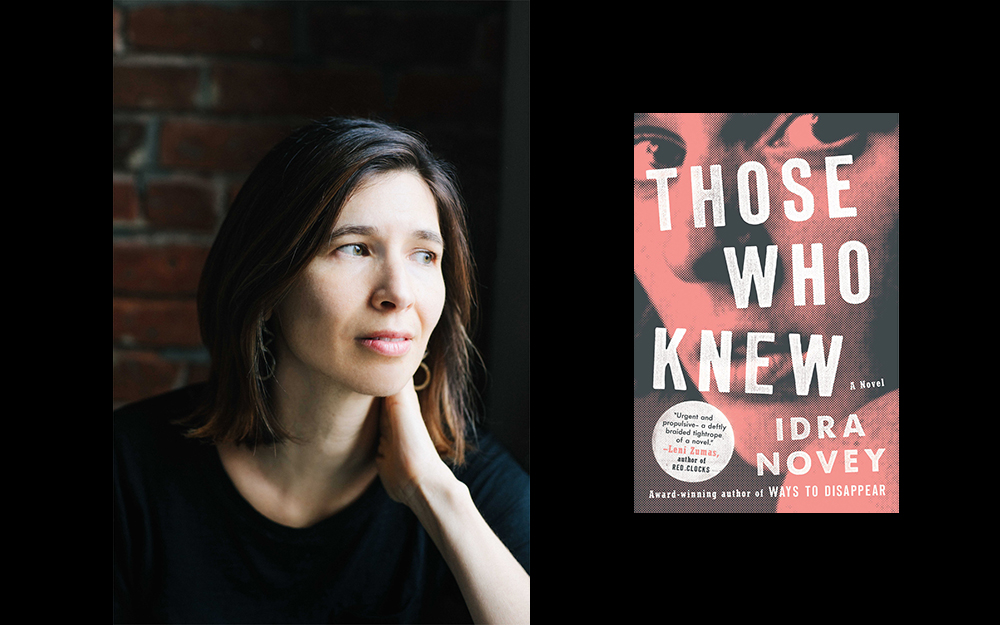
By Heidi Simmons
—–
Those Who Knew
by Idra Novey – Fiction
—–
Poverty breeds corruption. It seems the poorest countries suffer from tyrants who prefer to exploit their people rather than help them. In Idra Novey’s Those Who Knew (Viking, 248 pages), a small, unnamed island nation attempts to right wrongs that occurred a decade earlier.
The story begins with Lena who is on her way to a university protest.
Years before, she and other students were beaten and the campus was shut down. Now, she is a teacher, and the students are stronger and better organized. The tyrannical regime has fallen, but it’s corruption and ineptitude remains.
Higher education has become too expensive for the native islanders and something needs to be done, so they protest.
Although Lena is protesting the cost of education, her motives have changed. She is going to speak with the Senator – Victor — who is rallying student support for reelection.
Ten years before, Lena and Victor were once a thing attending rallies, writing slogans, making posters and Molotov cocktails together. But they grew apart and he moved on to another young college girl – and that girl ended up dead.
Lena believes Victor had something to do with the girl’s death and wants to confront him while he’s on campus campaigning for free education.
Lena’s attempt to get the truth from Victor goes nowhere and there is no proof. The police have closed the case citing accidental death. Lena moves on with her life, but Victor is regularly in the news advancing his political career.
When Lena becomes pregnant by a foreign exchange student, she has the child and raises him as a single parent. She and her old protesting friend Olga eventually settle in the mid-valley of the island and decide it’s time to take an active roll in changing their community and country.
Lena may be the protagonist, but the narratives move between Lena, Victor, Olga and Freddy – Victor’s gay brother. As the story unfolds, the reader gets a glimpse into everyone’s worldview.
Victor cannot control his sexual impulses and misogynistic tendencies. His lack of self-control for young women fuels his corruption and he quickly becomes a pawn of those more powerful. In his head he has done nothing wrong.
The story never develops around the death of the young girl Lena believes Victor killed. In the beginning, Lena believes she’s being haunted by the girl. But that goes nowhere.
The island nation and its ousted dictator are fictional and its location is never specified. I found myself constantly trying to surmise what nation it was modeled after and who were the complicit Northerners – the U.S.?
Author Novey does a good job creating the island’s disparity between the have and have-nots. Lena is from an important and well-off family, but she chooses to not reside in that world. She wants to earn her own living and live according to her values. Her family does not understand. Yet, her life is not such a challenge considering her fat bank account.
I wanted to know more about how the islanders found themselves enslaved to a tyrant and how they were able to rid their nation of his dogma. There is a bit about the beatings and those who caved to the corruption in order to continue to do business.
I never felt that I got a sense of the contrasting life a decade before compared to what it is they are fighting for now in story — other than free education.
Novey does not use punctuation when her characters are talking. The dialogue runs in long sentences and paragraphs with only the use of periods. Sometimes, I really liked it, but at other times I wasn’t sure who was saying what and to whom.
The author creatively uses journal entries and excerpts from a play Freddy is writing which adds to the character’s personal lives, but ultimately didn’t add enough to the bigger picture of what was happening.
Finally, the women take control of their lives – although it seemed to me they were making decisions for themselves all along. When Olga submits her name on a ballot, she’s the first woman to run for local government.
Those Who Knew seemed like it was on the cusp of being relevant and timely, but never fully actualized into a meaningful story. It felt like it was missing five chapters of the island’s history, the oppression of women and gays, and the serfdom of the working class.
Life on the “island” is changing and so is the nature of politics. Women are moving in and running for office. Could Those Who Knew be a metaphor for what is happening in our country?












































